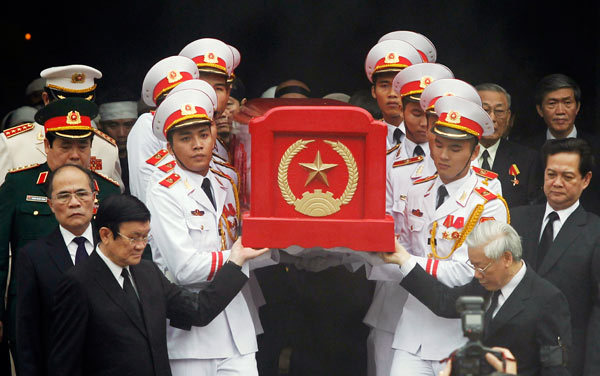Vietnam buries heroic general
 |
|
Vietnamese President Truong Tan Sang (front left), Vietnamese Prime Minister Nguyen Tan Dung (far right), along with leaders and soldiers, carry the coffin of the late General Vo Nguyen Giap during his funeral at the National Funeral House in Hanoi on Sunday. KHAM via Agence France-Presse |
Hundreds of thousands of people flooded the streets of Vietnam's capital on Sunday to bid a final farewell to the legendary war hero who led the Southeast Asian nation to victory over French and then US soldiers.
"Long live General Vo Nguyen Giap," people chanted, many in tears, as his flag-draped coffin passed by on a truck-drawn artillery carriage. The procession traveled along a 40-kilometer route from the national funeral house in downtown Hanoi to the airport.
Meanwhile, a state funeral for Giap was also held in his hometown in central Quang Binh province, as well as in southern Ho Chi Minh City and many other places in Vietnam.
Giap, who died on Oct 4 at age 102, was revered in Vietnam, second only to his mentor, former president Ho Chi Minh. Alongside the public outpouring of emotion, the government orchestrated an elaborate send-off for the general.
"You, comrade, have made a great and excellent contribution to the revolutionary cause of our party and nation," Communist Party chief Nguyen Phu Trong said in a eulogy read out at the funeral house. "Your personality and your great contribution were strongly imprinted in the hearts of the people."
Following the funeral, Giap's body was flown to his home province of Quang Binh in central Vietnam, with hundreds of thousands of people lining the 70-kilometer route from the airport to his burial site.
The ceremony was attended by President Truong Tan Sang and other top officials and broadcast live on state television.
Giap was buried in Quang Binh instead of the Mai Dich cemetery in Hanoi, where most high-ranking Vietnamese officials are traditionally buried, in accordance with his and his family's wishes.
Giap is best remembered for leading Vietnamese forces to victory over the French at Dien Bien Phu in 1954.
Giap ordered his jungle troops, clad in sandals made of old car tires, to besiege the French army. The French were defeated after 56 days, and the unlikely victory led not only to Vietnam's independence, but hastened the collapse of colonialism across Indochina and beyond.
AP — Xinhua





















